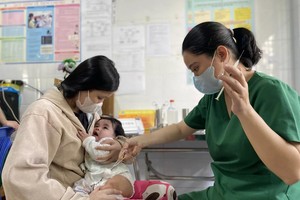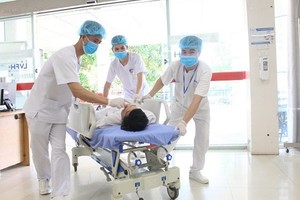Experts have asked for tighter controls on the importation of medical equipment in a bid to improve the quality of healthcare service in Viet Nam.

The call was made following a number of scandals involving the discovery of sub-standard or faulty imported equipment in healthcare centres in recent months.
Nguyen Van Tien, deputy chairman of the National Assembly's Committee on Social Affairs, said the Ministry of Health should draft a law on managing medical equipments.
Tien added that medical equipment must undergo comprehensive instead of random checks to guarantee its quality. However, there are many concerns about the application of a comprehensive check on medical equipment imports.
Most of the medical equipment imported from foreign suppliers was profitable in the market, according to Nguyen Minh Tuan, director of the Department of Medical Equipment and Health Facilities.
He said companies could find numerous ways to commit trade fraud, including counterfeit legal papers and formalities, false declaration of imported commodities and product codes, and the mixing of various types of commodities.
The health official added that the companies should be held responsible for such violations, and not the ministry.
"Previously, we put tight management on X-ray equipment and image-diagnosis equipment, but recently we have seen violations related to important testing equipments, which can bring about high profits," Tuan said.
He said for example, companies could take advantage of lax custom regulations to import old equipment, but declare it new or avoid further inspection if they didn't declare it was medical equipment.
Companies could also mix various products in a container to avoid inspection.
He also said customs posts had been asked to tighten the checking process for medical equipment to avoid similar cases.
"The checks on medical equipment must be done strictly, since this type of product can have a huge impact on people's health," he added.
In mid-August, the Ha Noi Market Management Department seized 12 allegedly substandard items of medical equipment from three private health clinics in Ha Dong District's Phung Hung Street.
The equipment included X-ray, ultrasound and ECG machines. The owners of the first two clinics could not produce any documents to show the place of manufacture of the machines.
At the last clinic, the market management department found an ECG machine being used without any quality verification done by authorised agencies.
Notably, in July, the Ha Noi Department of Health had to conduct consecutive inspections at five district-level hospitals across the city after the city-based Thuong Tin hospital was caught using a medical machine without documents to prove its origin.
The move followed a previous inspection by inspectors and officials from the municipal Department of Health, Department of Environment police and Thuong Tin District Police found that an automated biochemical analyser had been borrowed from an outside company.
The hospital's laboratory has three biochemal analysers, including one that is broken, a Greiner GA240 installed by the Department of Health, and a borrowed Hitachi 717, which is long out of production and has been placed on Viet Nam's list of prohibited imports.
Vu Xuan Tien, commissioner of the Ha Noi Lawyers' Association's Standing Committee, observed: "There is a lack of customs officers for the conduct of comprehensive checks on all types of imports."
Companies that have been strictly following customs procedures, paying taxes and committing no violations should be prioritised in customs services, Tien added.
A Customs Department representative agreed with Tien, saying companies would file complaints whenever customs offices were strict.
The customs officers always had to identify the products, companies and trading database that were prioritised for comprehensive checks and could only determine compliance with customs declarations rather than product quality, the customs representative noted.
He proposed that the Ministry of Health take responsibility for monitoring medical equipment in hospitals and medical centres if the equipment was licensed. To monitor the medical equipment, it should inspect the condition and quality of the machines and report low-quality equipment to the General Customs Department.
This could serve as the basis for customs offices to categorise products and improve performance.
Tien of the NA Committee on Social Affairs proposed that the ministry organise auctions to ensure the purchase of high-quality medical equipment at reasonable prices. However, the responsibility for ensuring the quality of auctioned equipment for hospitals and health care centres should fall on the shoulders of bidding organisers.
To improve healthcare services and reduce procedures and expenses for people, Tien said the ministry should set the standards for testing and examination of all medical equipment. This, he added, would improve the credibility and confidence of upper-level hospitals and medical centres.
It's estimated that 80 per cent of medical equipment is imported.
























